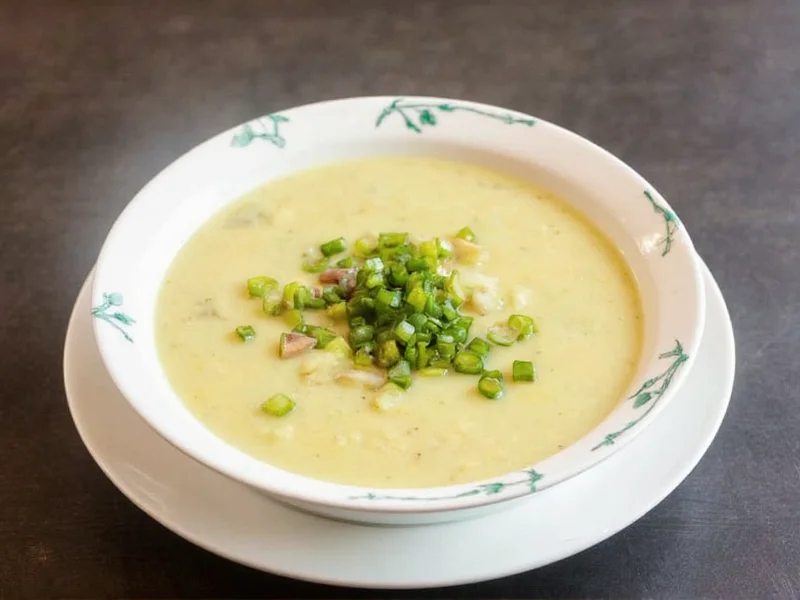The best cream-free leek and potato soup recipe combines 2 leeks (white parts only), 3 potatoes (peeled and cubed), 4 cups vegetable broth, 2 garlic cloves, 1 tbsp olive oil, salt, and pepper. Sauté leeks and garlic, add potatoes and broth, simmer until tender, then blend until smooth. This dairy-free alternative delivers rich flavor without heavy cream while maintaining that velvety texture through natural potato starch.
Why Skip the Cream in Classic Leek & Potato Soup?
Traditional leek and potato soup often relies on heavy cream for its signature velvety texture. However, many home cooks seek dairy-free alternatives for health reasons, dietary restrictions, or simply to enjoy a lighter version of this classic comfort food. The good news? You don't need cream to achieve that luxurious mouthfeel. Potatoes naturally release starch when cooked, creating a creamy consistency all on their own.
The Science Behind Cream-Free Creaminess
Understanding the culinary chemistry helps perfect your dairy-free potato leek soup. When potatoes simmer in liquid, their cell walls break down, releasing starch molecules that thicken the surrounding broth. Russet or Yukon Gold potatoes work best for this dairy-free creamy soup alternative because of their higher starch content compared to waxy varieties. The key is proper cooking technique—not overcooking the potatoes to the point of disintegration while ensuring enough starch releases into the broth.
| Ingredient | Quantity | Preparation Notes |
|---|---|---|
| Leeks (white and light green parts) | 2 medium | Thoroughly washed to remove grit between layers |
| Yukon Gold potatoes | 3 medium (about 1.5 lbs) | Peeled and cut into 1-inch cubes for even cooking |
| Vegetable broth | 4 cups | Low-sodium preferred for better flavor control |
| Garlic cloves | 2 | Minced finely |
| Olive oil | 1 tbsp | Extra virgin for best flavor |
| Fresh thyme | 1 tsp | Or ½ tsp dried thyme |
| Lemon juice | 1 tbsp | Essential for brightening flavors without cream |
Step-by-Step Cream-Free Cooking Method
Follow these precise steps for the perfect dairy-free potato leek soup:
- Prepare leeks properly: Slice off dark green tops (save for stock), halve lengthwise, and rinse thoroughly under running water to remove trapped soil between layers.
- Sweat, don't brown: Heat olive oil over medium-low heat. Add leeks and garlic, cooking gently for 8-10 minutes until softened but not colored—this builds flavor without bitterness.
- Add potatoes carefully: Stir in cubed potatoes and thyme, coating them with the softened leeks for 2 minutes before adding broth.
- Simmer strategically: Bring to a gentle simmer (not boil) and cook uncovered for 15-20 minutes until potatoes pierce easily with a fork but haven't disintegrated.
- Blend to perfection: Use an immersion blender directly in the pot for safest results, or carefully transfer to a countertop blender in batches. Blend until completely smooth—this activates the potato starch for maximum creaminess.
- Finish with acidity: Stir in lemon juice just before serving. This brightens flavors and mimics the tang that dairy would provide.
Avoiding Common Cream-Free Soup Mistakes
Many home cooks encounter issues with dairy-free potato leek soup. Here's how to prevent them:
- Watery texture: Caused by insufficient potato starch release. Solution: Use adequate potatoes (3:1 potato-to-broth ratio) and simmer until potatoes are fully tender before blending.
- Bland flavor: Without cream's richness, seasoning becomes critical. Solution: Salt in layers—when sautéing leeks, after adding potatoes, and again after blending.
- Grainy consistency: Results from under-blending. Solution: Blend for full 60-90 seconds until completely smooth, passing through a fine-mesh sieve if necessary.
- Separation: Can happen when adding cold ingredients to hot soup. Solution: Temper any additions by mixing a small amount of hot soup with them first.
Flavor Variations for Dietary Needs
This versatile dairy-free potato leek soup adapts beautifully to various dietary requirements:
- Vegan version: Already naturally vegan when using vegetable broth—just ensure your broth contains no dairy derivatives.
- Gluten-free preparation: Naturally gluten-free; verify broth is certified GF if needed for severe sensitivities.
- Lower-carb option: Replace half the potatoes with cauliflower florets for reduced starch content while maintaining creaminess.
- Protein boost: Stir in ½ cup white beans after blending for added protein and fiber without affecting texture.
Serving Suggestions That Elevate Your Soup
Without cream's visual richness, presentation becomes more important. Try these finishing touches:
- Drizzle with high-quality extra virgin olive oil just before serving
- Add a sprinkle of fresh chives or minced parsley for color contrast
- Include roasted potato wedges as a garnish for texture variation
- Pair with crusty whole-grain bread for dipping
- Add a pinch of smoked paprika for depth of flavor
Storage and Reheating Best Practices
Dairy-free soups often reheat better than cream-based versions. Follow these guidelines:
- Cool completely before storing in airtight containers
- Refrigerate for up to 4 days or freeze for 3 months
- Reheat gently over medium-low heat, stirring frequently
- Add a splash of broth if soup thickens too much during storage
- Always finish with fresh lemon juice after reheating to refresh flavors
Nutritional Benefits of Cream-Free Preparation
Eliminating cream transforms this comfort food into a nutrient-dense meal. A typical serving (1.5 cups) of dairy-free potato leek soup contains approximately:
- 210 calories (vs. 320+ in cream versions)
- 4g fiber (20% of daily value)
- Significant vitamin C and B6 from potatoes
- Prebiotic compounds from leeks supporting gut health
- No saturated fat from dairy sources











 浙公网安备
33010002000092号
浙公网安备
33010002000092号 浙B2-20120091-4
浙B2-20120091-4